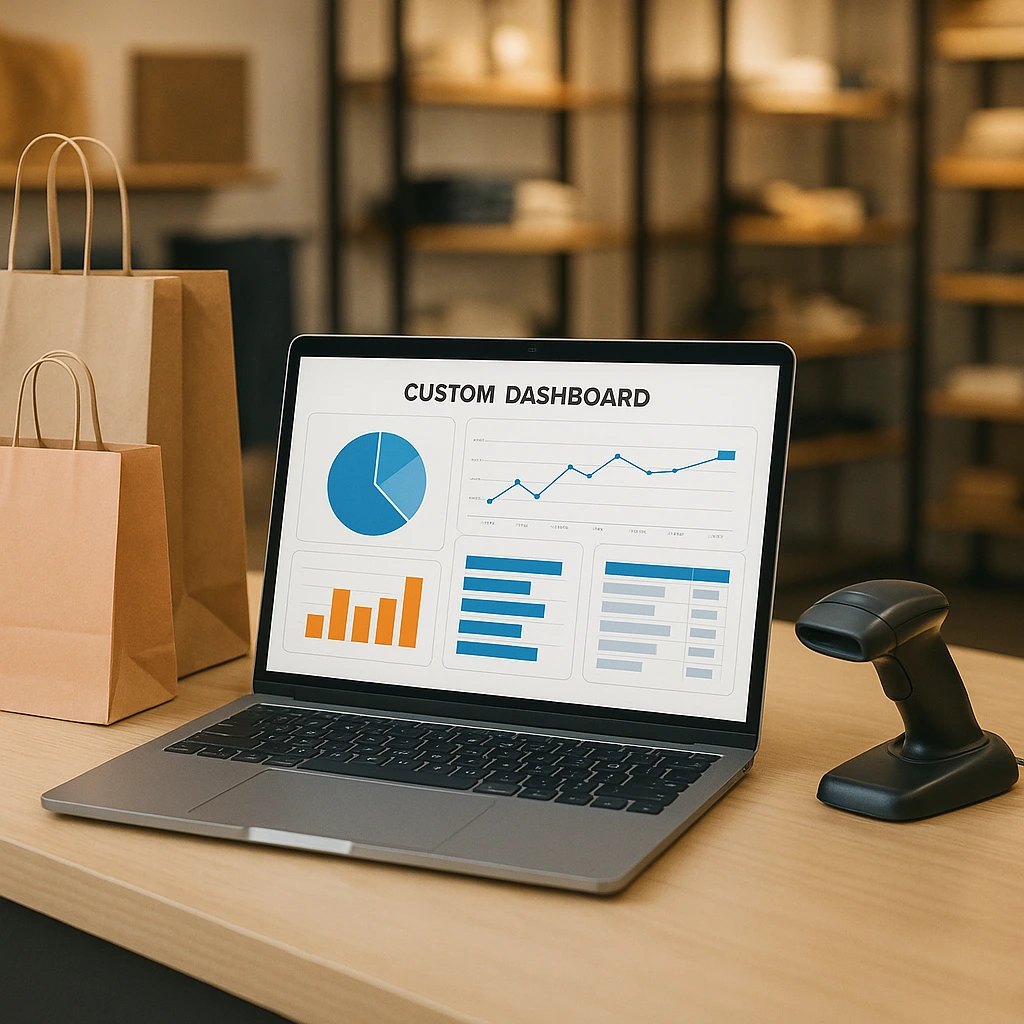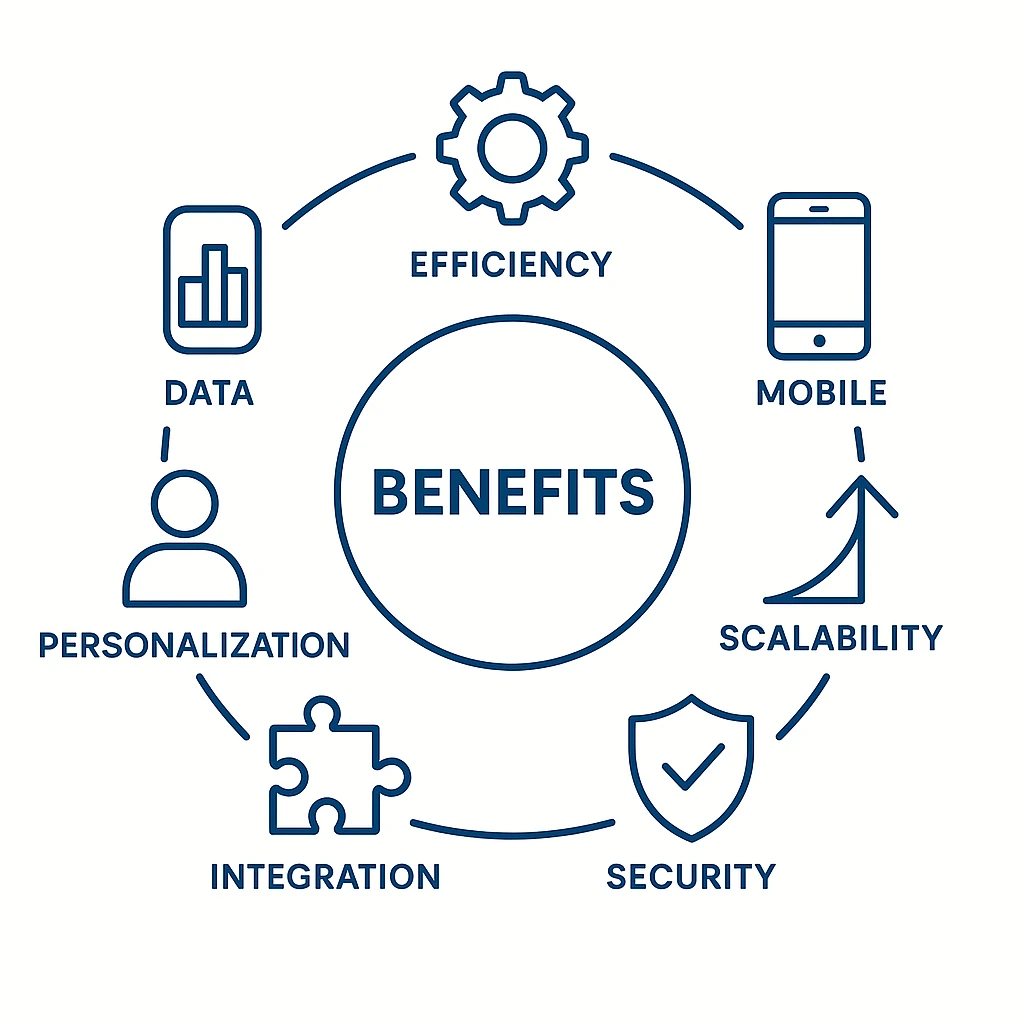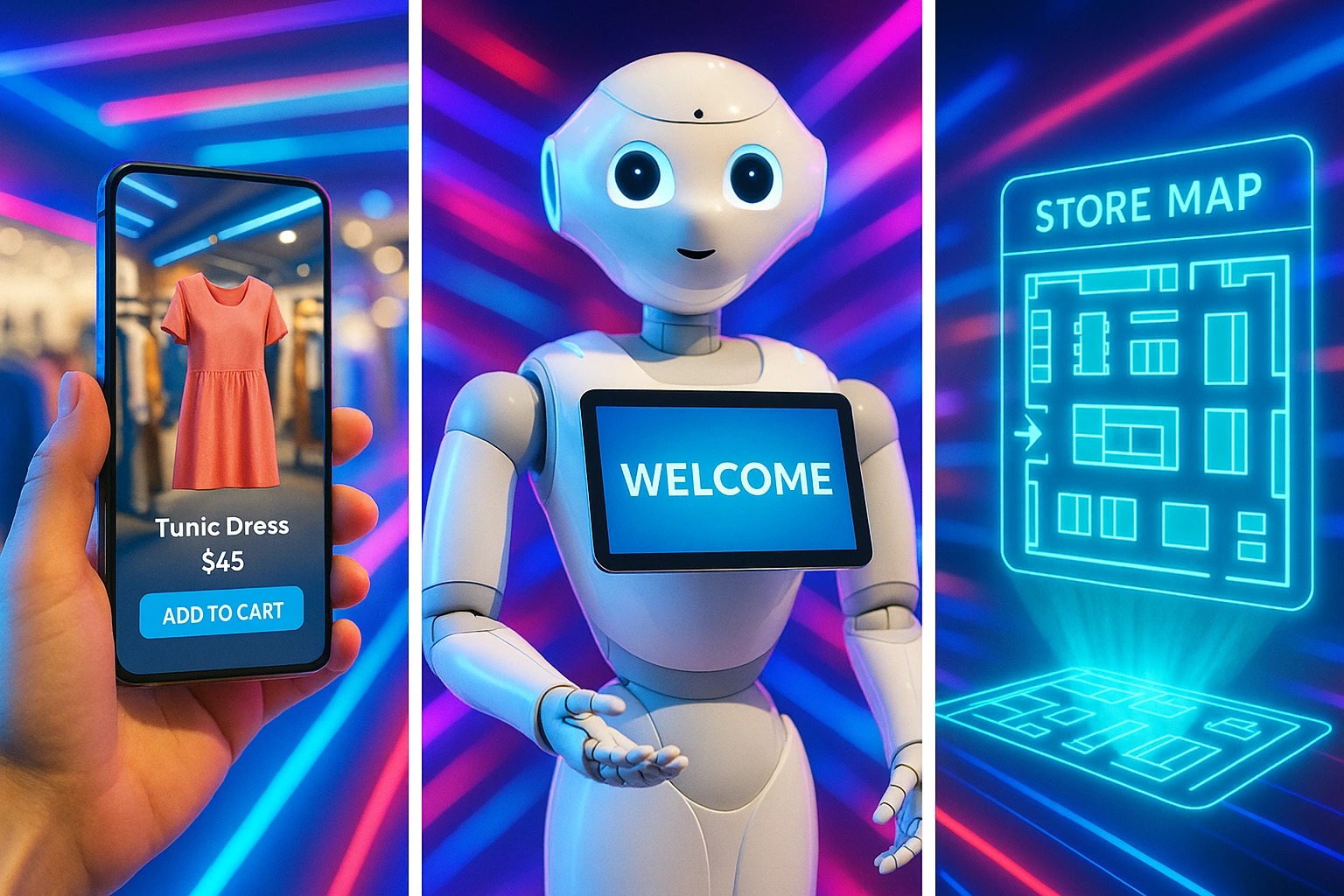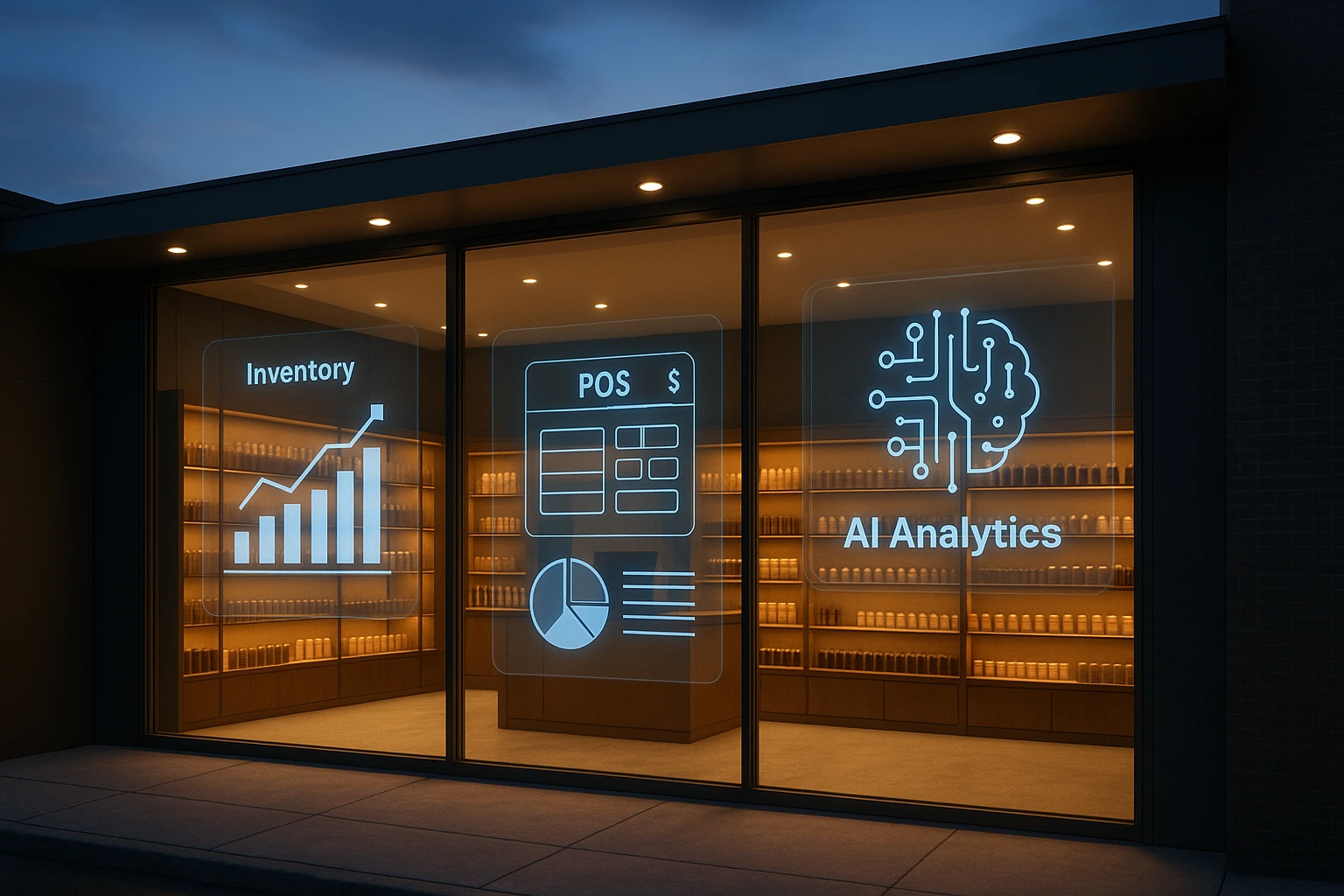Table Of Contents
Introduction to Custom Retail Software Development
Key Technologies, Tools and Trends
Development Processes and Best Practices
Case Studies and Industry Success Stories
Bringing It All Together with Effective Implementation
Industry Insights and Next Steps
Conclusion
Frequently Asked Questions (FAQs)
Key Takeaways
Custom retail software development is all about creating unique solutions that fit your specific business needs.
These tailored solutions can help streamline your processes and improve customer experiences.
Integrating tools like POS systems and CRM platforms makes operations smoother and helps with inventory management.
Almost any industry, especially retail, healthcare, and finance can benefit from creating custom software solutions.
Trust Tridev Technologies’ expert development team to boost your business with top-notch custom software, mobile apps, and cloud solutions for startups, SMBs, and enterprises.
Introduction to Custom Retail Software Development
Custom retail software development serves as a tailored solution for the unique needs of today’s retail businesses. As the retail environment rapidly evolves, having the right technology in place is crucial for ensuring a seamless customer experience and driving efficient operations. With custom solutions, retailers can harness automation to reduce manual tasks and use data-driven marketing strategies to reach their target audience more effectively.

Tailored Solutions for Unique Retail Needs
Retail businesses vary greatly in size and customer base. A one-size-fits-all approach rarely delivers the best outcome. Custom software is designed specifically for the business at hand, taking into account its specific operational structures, customer expectations, and market trends. For instance, a custom solution can integrate a store’s inventory management system with an online shopping platform, making it easier to keep stock updates current in real time. This not only minimizes errors but also streamlines the shopping experience across both online and physical stores.
Personalized dashboards that highlight key performance indicators
Automated stock updates and order processing
Real-time analytics for inventory, customer behavior, and sales trends
Benefits like Automated Tasks and Data-Driven Marketing
One of the major strengths of custom retail software is its ability to automate repetitive tasks. Manual data entry, inventory tracking, and even customer follow-up communication can be automated to reduce errors and free up staff to focus on more strategic activities. Furthermore, the software can consolidate data from multiple sources to aid in marketing decisions. Instead of guessing which products might trend during a particular season, retailers can base their decisions on accurate, data-driven insights.
Automation reduces human error and improves operational efficiency
Data integration leads to better customer insights and marketing strategies
Real-time reporting helps businesses adapt quickly to changes
Key Technologies, Tools and Trends
The modern retail landscape is driven by advanced technologies that enable businesses to deliver an integrated customer experience. From POS systems to CRM integrations and emerging technologies like artificial intelligence (AI) and blockchain, each element plays a critical role in building a robust retail software solution.
Innovations in POS Systems
The point-of-sale (POS) system is much more than a simple transaction terminal these days. Modern POS solutions are integrated business hubs that manage payments, inventory, customer data, and even employee management. Today’s custom retail software often builds on these systems to further enhance operational efficiency.

Digital receipts and automated checkout processes
Integration with mobile devices for on-the-go transactions
Enhanced user interfaces that are designed for ease of use and speed
A well-integrated POS system ensures accurate data capture and supports various payment options. Custom solutions might also link the POS system with loyalty programs, making it easier to reward repeat customers and encourage repeat business.
Ready to Revolutionize Your Retail Operations with Smart, Scalable Software?
Discover how custom-built retail solutions can streamline your workflows, boost ROI, and future-proof your business. Whether you're running one store or a global chain — we’ve got the tech to power your growth.
CRM Integrations and Customer Engagement
Customer Relationship Management (CRM) systems are another pillar of the modern retail technology stack. Integrating custom retail software with a CRM system gives businesses a 360-degree view of each customer. This integration allows for highly personalized marketing campaigns and better customer service. Retailers can use the data to tailor promotions, track customer interactions, and efficiently manage return policies.
Centralized customer database with purchase history and preferences
Automated follow-ups for abandoned carts or post-purchase feedback
Segmented marketing campaigns based on customer behavior
By linking a CRM with a custom solution, retailers ensure every customer touchpoint is maximized, from initial contact to post-purchase support.
AI and Blockchain in Retail
Artificial intelligence (AI) is finding its way into many business processes, and retail is no exception. AI-driven applications can predict demand, optimize pricing, and even anticipate customer behaviors. For example, predictive analytics can forecast inventory needs, while chatbots enhance the customer service experience.
AI chatbots for customer inquiries and support
Automated demand forecasting to optimize inventory levels
Personalized recommendations based on customer purchase history
Blockchain technology, on the other hand, brings about enhanced security and transparency. It can be used in retail for secure transactions, supply chain tracking, and verifying product authenticity. This is especially important for high-value items and industries where provenance is a concern.
Immutable records for product history
Enhanced security for financial transactions
Increased customer trust through transparent supply chain data
Real-World Platforms and Tools
Real-world examples illustrate how these technologies come together to create effective retail solutions. Platforms like ReactJS and Shopify are widely adopted in custom retail software development. ReactJS offers a dynamic user interface while Shopify provides a comprehensive ecosystem that supports both online and offline retail operations.
A comparative look at these platforms highlights their strengths:
Feature | ReactJS | Shopify |
User Interface | Dynamic and responsive design | Intuitive and easy-to-use templates |
Customization | Highly customizable with JSX | Ready-made solutions with custom apps |
Integration | Ideal for front-end integration | Comprehensive e-commerce integrations |
Scalability | Suitable for complex applications | Scalable for growing retail businesses |
Community Support | Large open-source community | Extensive support through Shopify ecosystem |
Each platform offers distinct advantages. For retail businesses that require versatile front-end development and tailor-made interfaces, ReactJS is a solid choice. Meanwhile, Shopify’s comprehensive backend solutions make it a preferred option for businesses that need robust e-commerce functionality integrated within their retail operations.
Ready to Revolutionize Your Retail Operations with Smart, Scalable Software?
Discover how custom-built retail solutions can streamline your workflows, boost ROI, and future-proof your business. Whether you're running one store or a global chain — we’ve got the tech to power your growth.
Development Processes and Best Practices
Creating an effective custom retail software solution requires a methodical approach, from needs assessment and design to deployment and ongoing support. Following a well-defined process makes sure the final product is not only robust but also flexible enough to grow with the business.
Needs Assessment and Planning
Before any code is written, understanding the specific challenges and goals of the retail business is critical. The planning phase involves detailed requirements gathering, stakeholder interviews, and a thorough market analysis. The aim is to develop a clear roadmap that addresses both current needs and future scalability.
Identify key pain points in current operations
Analyze customer feedback and market trends
Set clear performance metrics and success indicators
This phase involves close collaboration with the business team to ensure every aspect of the solution aligns with the company’s goals. Tools like surveys, stakeholder interviews, and workflow analyses are common methods used in the planning stage.
Design and Architecture
The design phase is where ideas begin to take shape. With clear goals in mind, software architects work on designing an application that is agile, scalable, and secure. This includes deciding on a technology stack, designing user interfaces, and creating a detailed architecture plan.
Use proven design patterns that facilitate scalability
Create user-friendly interfaces that simplify navigation
Ensure security by integrating rigorous authentication and authorization protocols
During the design phase, it can be helpful to consult resources like Google Developers for insights on creating useful and friendly content. The design should reflect both the business’s operational needs and the customer’s expectations, leading to an intuitive and effective solution.
Integration and Testing
Once the design is complete, the development team builds each component in a modular manner. Integration is a significant part of the process—ensuring that modules like POS systems, CRM integrations, and AI elements work together seamlessly can be challenging.
Develop in iterative cycles to catch and fix issues early
Use automated testing tools to ensure consistency and reduce human error
Integrate third-party services carefully to maintain system stability
Quality assurance (QA) is essential during this phase. By testing components individually and as part of the overall system, developers can identify potential bottlenecks and conflicts before they affect the full deployment.
Deployment and Training
Deploying custom software into a live environment requires careful planning to minimize downtime and disruption. A phased rollout is often recommended, allowing the business to gradually adapt to the new system.
Use a pilot phase to gather user feedback
Transition in stages to ensure staff can adjust smoothly
Plan for extensive user training and create documentation for common tasks
Training sessions are an important aspect of deployment. They ensure that employees understand how to use the new system effectively, reducing resistance and errors during the adoption phase. Providing detailed user manuals and setting up a dedicated support channel can also enhance the transition process.
Ongoing Support and Evolution
The launch of custom retail software is not the final step but rather the beginning of a continuous cycle of improvement. Ongoing support is necessary to address issues as they arise and to update the system in response to changing business needs or technological advancements.
Regular updates to maintain system security and performance
Feedback loops with users to capture improvement suggestions
Integration of new technologies to keep the software competitive
A support plan might include regular check-ins, troubleshooting sessions, and even scheduled training refreshers. Online resources and knowledge bases can be an effective way to help users find quick solutions to common issues. Staying proactive in addressing both minor bugs and major shifts in technology ensures that the custom solution remains effective over time.
Case Studies and Industry Success Stories
Examining real-world examples of successful custom retail software implementations provides valuable insights. These case studies showcase innovative strategies, creative client success stories, and the technologies adopted by leading firms.
Ready to Revolutionize Your Retail Operations with Smart, Scalable Software?
Discover how custom-built retail solutions can streamline your workflows, boost ROI, and future-proof your business. Whether you're running one store or a global chain — we’ve got the tech to power your growth.
Implementation Highlights from Key Clients
Several retail businesses have transformed their operations using tailored software solutions, and these examples illustrate the power of customization.
A well-known regional retailer integrated a custom POS system with their online store, reducing checkout times by 40% and increasing customer satisfaction.
A boutique brand used data-driven marketing enabled by real-time analytics to tailor promotions, resulting in a 25% increase in repeat customers.
An international chain adopted AI-powered predictive analytics to manage inventory, reducing overstock and understock situations by nearly 30%.
These implementations show how the right blend of technology and strategy can lead to significant improvements in operational efficiency and customer engagement. Integrating CRM data with automated marketing campaigns helped retailers reach customers with personalized offers at the right time.
Strategies and Tools Used by Leading Firms
Leading companies in the retail sector often rely on modern development methodologies and cutting-edge tools. Their approaches provide a benchmark for others looking to achieve similar success.
Agile development techniques allow for continuous feedback and iterative improvement
Use of cloud-based services ensures scalability and reliability
Integration with social media platforms sharpens data collection and customer outreach
For example, one prominent retailer adopted a hybrid solution that combined the flexibility of custom software with the comprehensive features of established platforms like Retail & E-commerce Solutions | Tridev Technologies. Their system incorporated mobile-friendly interfaces and automated customer service functions. This approach allowed them to see a measurable improvement in customer engagement and sales conversion rates.
Comparative Insights: Custom vs. Off-the-Shelf Solutions
A common discussion in the industry revolves around building custom software compared to using off-the-shelf platforms. Both approaches have their merits, but custom solutions often provide greater control over functionalities and future scalability.
Custom Software Development:
Pros:
Fully tailored to business needs
Easier integration with unique operational workflows
Greater flexibility for future enhancements
Cons:
Higher initial cost and investment
Longer development cycle
Off-the-Shelf Solutions:
Pros:
Quick deployment and lower upfront costs
Standardized functionalities that work out of the box
Regular updates provided by vendor
Cons:
Limited customization options
Potential incompatibility with specific business requirements
This comparison highlights that while off-the-shelf options may serve small-scale needs or offer a quick fix, custom software is the way forward for businesses aiming for a competitive edge and long-term growth. Many retailers have shifted to custom solutions to meet the demands of a rapidly changing market and to optimize both their customer experience and operational efficiency.
Real-World Impact and Future Trends in Retail Technology
Some industry success stories have revealed that the impact of customized software solutions extends beyond immediate operational gains. Retailers are now seeing sustained improvements over time. For example, one retailer reported that post-customization, store managers spent 50% less time on administrative tasks, allowing them to focus more on customer service and strategic planning.

Real-world data from various deployments suggests that businesses can experience benefits such as:
Reduced operational costs due to workflow automation
Increased revenue from personalized marketing and improved customer engagement
Better decision-making driven by integrated analytics and reporting
Future trends point toward further integration of AI, machine learning, and augmented reality to enhance the retail experience even further. Innovations in customer engagement, like personalized virtual store assistants and immersive shopping experiences, are on the horizon. Retailers who invest early in custom technology development can position themselves to quickly adapt to these future trends, ensuring they remain competitive.
Ready to Revolutionize Your Retail Operations with Smart, Scalable Software?
Discover how custom-built retail solutions can streamline your workflows, boost ROI, and future-proof your business. Whether you're running one store or a global chain — we’ve got the tech to power your growth.
A few notable trends include:
Use of machine learning algorithms to provide real-time price adjustments based on market factors
Expansion of mobile-first solutions to cater to the increasing number of customers shopping via smartphones
Incorporation of augmented reality features that allow customers to try products virtually before making a purchase
Enhanced data privacy measures and secure transactions using blockchain
These trends signify that custom retail software development is not a static solution but a dynamic process that evolves as new challenges and opportunities emerge within the retail market. For businesses seeking a future-proof solution, partnering with an expert team like the one at Custom Software Development Services | Tridev Technologies can help in designing systems that are built for long-term growth and adaptability.
Bringing It All Together with Effective Implementation
Implementing a robust custom retail software solution involves a blend of modern technology, strategic planning, and continuous improvement. Each stage of development, from initial needs assessment to post-deployment support, must be carefully managed to ensure that the final product delivers tangible business benefits and scales with evolving market demands.
Step-by-Step Implementation Process
A typical implementation approach might follow these key steps:
Define clear objectives based on business requirements and pain points
Conduct thorough research and gather stakeholder input to guide project scope
Choose the right technology stack, keeping in mind the importance of scalability and integration
Develop a prototype to validate the approach and make necessary adjustments based on feedback
Gradually integrate the new system with existing processes while training staff on new functionalities
Monitor system performance continuously through analytics and feedback loops, and optimize the solution accordingly
Using this methodical yet flexible strategy ensures that custom software not only meets the immediate needs but also evolves to support future growth and market shifts.
Practical Tools and Templates
Many teams leverage practical tools and templates to streamline the custom retail software development process. Here are some useful resources:
Workflow templates for mapping business processes
Testing frameworks for automated QA cycles
Integration blueprints that detail how various modules like POS, CRM, and e-commerce platforms communicate
Project management tools for agile sprints and milestone tracking
These tools help maintain order during the development process even when challenges arise. By using templates and frameworks, teams can reduce uncertainty and maintain a clear focus on task completion, ensuring that each phase of the project is executed efficiently.
Ready to Revolutionize Your Retail Operations with Smart, Scalable Software?
Discover how custom-built retail solutions can streamline your workflows, boost ROI, and future-proof your business. Whether you're running one store or a global chain — we’ve got the tech to power your growth.
Collaborative Practices and Communication
Successful implementation relies heavily on effective collaboration between the development team and the business stakeholders. Regular communication, iterative reviews, and transparent reporting practices are essential for achieving the desired outcomes.
Weekly or bi-weekly stakeholder meetings to review progress and adjust priorities
A centralized project dashboard for real-time updates and issue tracking
Clear documentation of changes, feedback, and subsequent improvements
Working in this open environment allows teams to anticipate potential issues early and adjust their strategies accordingly. It also ensures that everyone remains aligned with the overall vision and that the final product reflects both the technical and business objectives.
Evaluating Success Through KPIs
Measuring the impact of a custom retail software solution is critical for understanding its value. Key performance indicators (KPIs) serve as benchmarks for success. Common KPIs include:
Reduction in manual processing times
Increase in sales conversion rates
Improvement in customer satisfaction scores
Enhanced accuracy in inventory management
Regular reviews against these KPIs provide insights into what is working and what needs improvement. Data from these evaluations can then be used to drive further enhancements in the software solution.
Industry Insights and Next Steps
Successful custom retail software development is at the intersection of technology, smart business practices, and continuous innovation. As the retail world becomes increasingly competitive, the ability to respond quickly to both market demands and technological advancements is more important than ever.
Innovative Strategies from Leaders in Retail Technology
Leading firms have adopted a mix of custom software development techniques and traditional business strategies to stay ahead. They utilize:
Integrated systems that drive real-time decision-making
Customer engagement tools that leverage AI for personalized marketing
Agile development that allows for rapid iterations and continuous improvements
These strategies are complemented by the use of modern platforms like Shopify and frameworks such as ReactJS, which empower businesses to create highly responsive and adaptable retail software ecosystems.
Emphasizing Ongoing Improvement and Scalability
The most effective custom retail software solutions are those that continue to evolve. With continuous market feedback, regular updates, and a proactive approach to adopting emerging technologies, retailers can build systems that not only meet today’s requirements but also adapt to future challenges.
Schedule regular system updates to incorporate new features and security measures
Maintain flexibility in your software architecture to quickly integrate new tools
Engage with end-users consistently to drive system improvements that matter
This kind of agile and adaptable approach ensures that business investments in custom software development translate to sustained success.
Internal Collaboration and Strategic Partnerships
Collaboration with technology vendors, strategic partners, and internal stakeholders is crucial. For instance, aligning with experts in Elevate Your Business with Custom Software Solutions | Tridev Technologies can provide access to specialized development teams who understand both the technical and business aspects of retail. This collaborative approach minimizes risks and accelerates the implementation process.
Develop cross-functional teams that combine technical expertise and retail experience
Use partnerships to gain insights into emerging trends and best practices
Prioritize a shared vision that focuses on enhancing the overall customer experience
By leveraging expert teams and strategic collaborations, retailers can navigate complex technological landscapes and achieve a competitive edge.
Evaluating and Iterating for Long-Term Success
Continuous improvement is a key pillar of any successful custom software implementation. Retailers should engage in regular performance reviews and be willing to iterate based on evolving business needs and technological advancements. This cycle of evaluation and iteration is what keeps custom retail software relevant and impactful over time.
Analyze system performance and user feedback regularly
Be prepared to make adjustments to meet changing market dynamics
Invest in ongoing developer training and support to keep pace with new technologies
These steps ensure that the software remains aligned with business strategies, leading to improved operational efficiency and long-term growth.
By understanding and applying these strategies, retail operations can unlock
Ready to Revolutionize Your Retail Operations with Smart, Scalable Software?
Discover how custom-built retail solutions can streamline your workflows, boost ROI, and future-proof your business. Whether you're running one store or a global chain — we’ve got the tech to power your growth.
the full potential of custom software development. When approached with the right mix of technology, planning, and continuous improvement, custom retail software solutions empower businesses to better manage their operations, drive customer engagement, and achieve a sustainable competitive advantage.
Conclusion
This article reminded us that custom retail software development can simplify workflows and enhance efficiency. We learned the value of tailored solutions, smoother integration, and improved business operations. It’s a mixed bag of insights, but clear in showing benefits for startups, SMBs, and enterprises. For custom software, mobile apps, and cloud solutions, trust in Custom Software Development | Tridev Technologies to boost your business.
